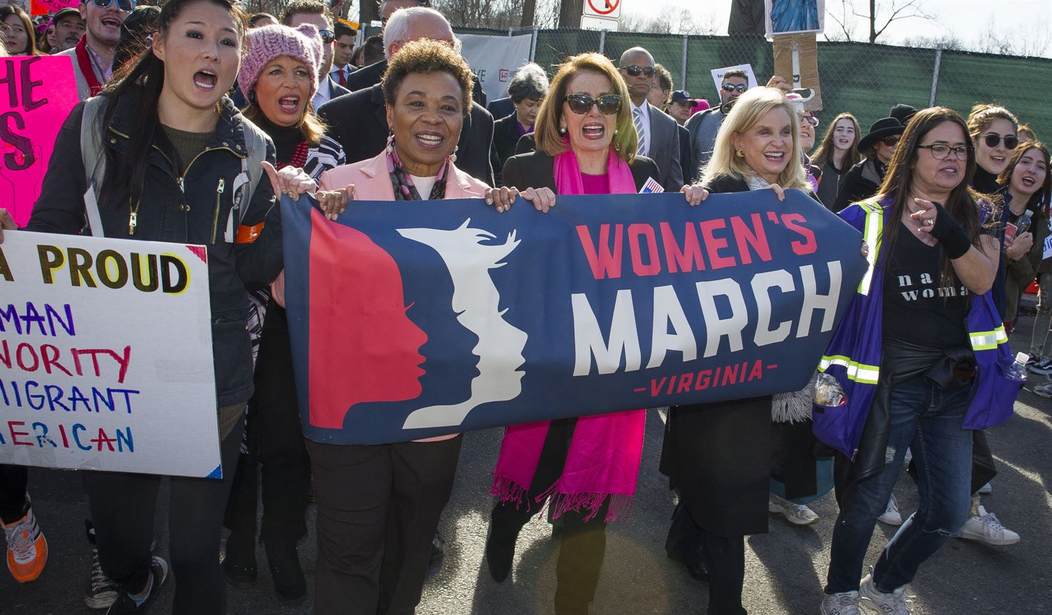The Women’s March promises to include a diverse set of women. But there’s one woman it didn’t invite this year: Amy Coney Barrett.
The second 2020 Women’s March, held on October 17, centers on sending an “unmistakable message about the fierce opposition to Trump and his agenda, including his attempt to fill Ruth Bader Ginsburg’s seat on the Supreme Court. This comes after the president nominated Judge Barrett, a brilliant jurist admired even by legal experts who disagree with her, as the late justice’s replacement. This latest march takes a stand against Barrett, even as so many American women identify with her story.
It’s true that Ginsburg’s seat is a big one to fill – and should be approached with thoughtful consideration. At her nomination, Barrett herself recognized the late justice as a “woman of enormous talent” who “not only broke glass ceilings” but also “smashed them.”
But this march isn’t just against President Trump nominating a new justice – the timing of it, or the politics surrounding it. It’s also specifically against his nominee, a woman: Judge Barrett.
Confirming this, the Washington Post named its live stream of the D.C. event, “Women's March protests Amy Coney Barrett.” And, in the promo video, the Women’s March included a clip questioning Barrett and her abortion position.
“Amy Coney Barrett won’t say if climate change is real, if presidents should commit to a peaceful transfer of power, if cases protecting marriage equality and our right to birth control were correctly decided,” the Women’s March tweeted on October 14. “Not only is her nomination illegitimate, it's a danger to our future.”
In other words, according to the Women’s March, Judge Barrett “is an affront to everything that Justice Ginsburg fought for.”
Among other things, she stood against women, the group complained on September 28.
“All of the progress that has been made—for women, people of color, LGBTQ+ people, and more—could be rolled back if Barrett is confirmed,” it urged.
The Women’s March also accused her of being an “anti”: “anti-immigrant,” “anti-choice,” “anti-lgbt,” and “anti-gun control.”
Recommended
She was also anti-feminist, it said.
“Her presence on the Supreme Court would be a direct threat against all the freedoms, rights, and feminist values we've fought so hard to defend under Trump,” it added in another tweet on September 26.
And yet, in its haste to condemn her, the Women’s March overlooks the American women who identify with Amy Coney Barrett. They exist.
“For Conservative Christian Women, Amy Coney Barrett’s Success Is Personal,” one New York Times headline read on September 28. A Politico opinion headline declared, “Amy Coney Barrett: A New Feminist Icon” the day before. Another opinion piece, in America magazine, announced, “I see my own pro-life feminism in Amy Coney Barrett” on October 14. “Feminists Should Be Celebrating Amy Coney Barrett,” another piece, published by National Review, argued.
Each was written by a woman.
That’s something that should attract the Women’s March, which tries to come across as inclusive. Its self-described mission, after all, is “to harness the political power of diverse women and their communities to create transformative social change.”
“We must create a society in which women - including Black women, Indigenous women, poor women, immigrant women, disabled women, Jewish women, Muslim women, Latinx women, Asian and Pacific Islander women, lesbian, bi, queer, and trans women - are free and able to care for and nurture their families,” the Women’s March declares, “however they are formed, in safe and healthy environments free from structural impediments.”
The list notably doesn’t include pro-life or conservative women who, from the beginning, have been excluded. But pro-life groups, such as New Wave Feminists, and conservative groups, such as Independent Women’s Forum (IWF), still attend in an unofficial capacity – or host their own rallies.
Destiny Herndon-De La Rosa, the head of New Wave Feminists, which was uninvited as a partner from the first Women’s March in 2017, has stressed that even women marching in the Women’s March support them.
“We were so overwhelmed by the positivity of women coming up to us and saying, ‘We disagree with that decision’ and ‘We’re so glad you’re here,’” she said last year, referring to the reaction of women at past marches.
This year, New Wave Feminists had a presence again, as did IWF, which hosted an “I’m with Her” rally – “her,” meaning Amy Coney Barrett.
“The Women’s March is a picture of today’s feminist movement,” IWF President Carrie Lukas told the Washington Times. “It purports to speak for all women, but it ignores all of the women who reject its extreme progressive agenda.”
Tammy Bruce, the president of Independent Women’s Voice, IWF’s sister organization, added that the “so-called women’s movement is standing by while the mainstream media questions if Amy Coney Barrett can be a Supreme Court justice and a good mother, in addition to vilifying her background and her faith.”
At the same time, Barrett stresses that she values women and their choices. She addressed this while answering the question, “Can women really have it all?” at a Hillsdale College event last year.
“I think each woman is called to a unique path,” she urged. “I don’t think there’s one cookie-cutter way that women should proceed.”
“One thing I think that is really important not to lose sight of, is that we are so fortunate as women living in 2019 to have so many more doors open to us, and so many choices,” she said. “But I think as part of that conversation, I always want to be careful never to devalue the choices that women make that are different.”
That’s a message that the Women’s March should embrace, too.

























Join the conversation as a VIP Member